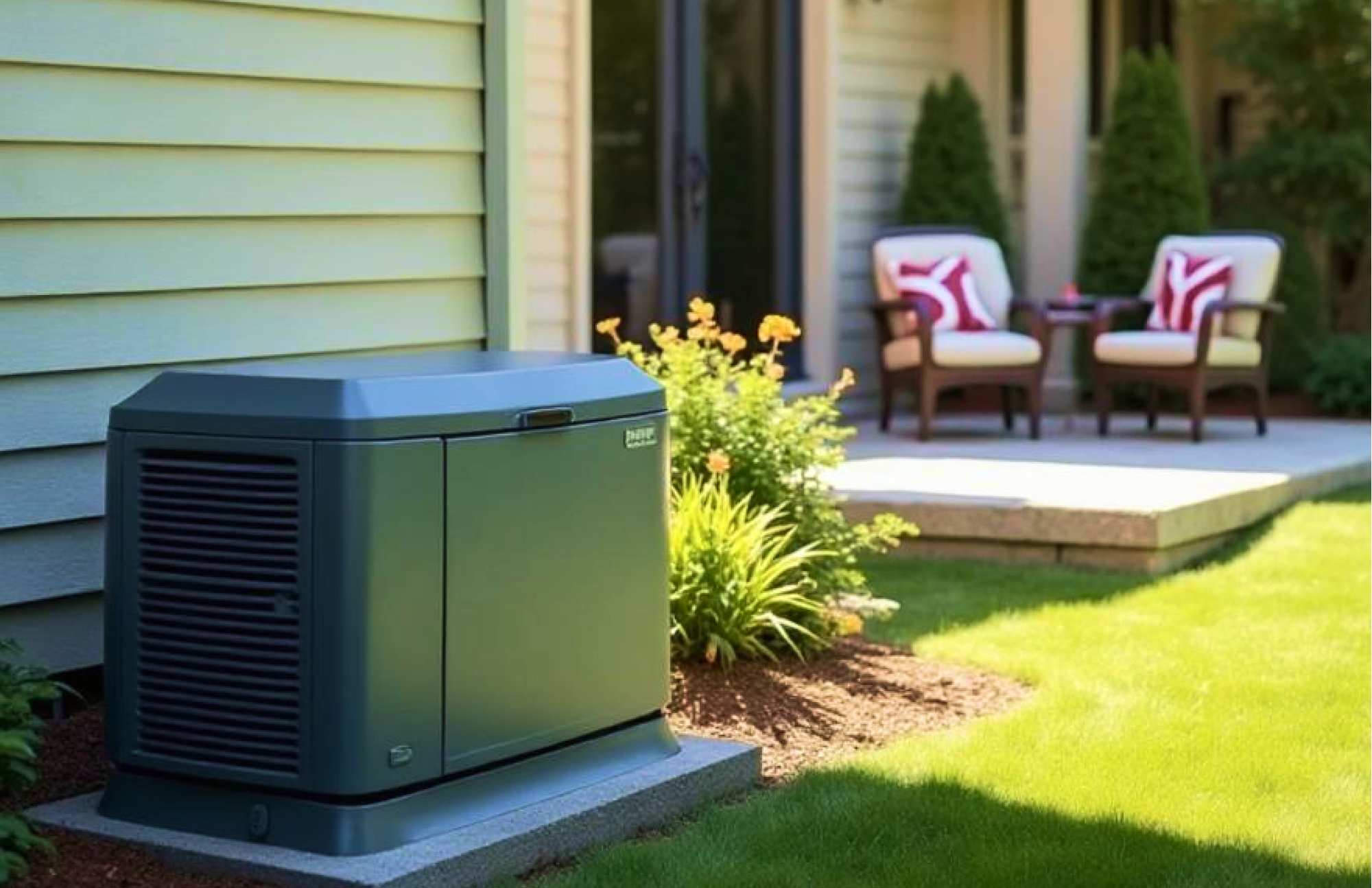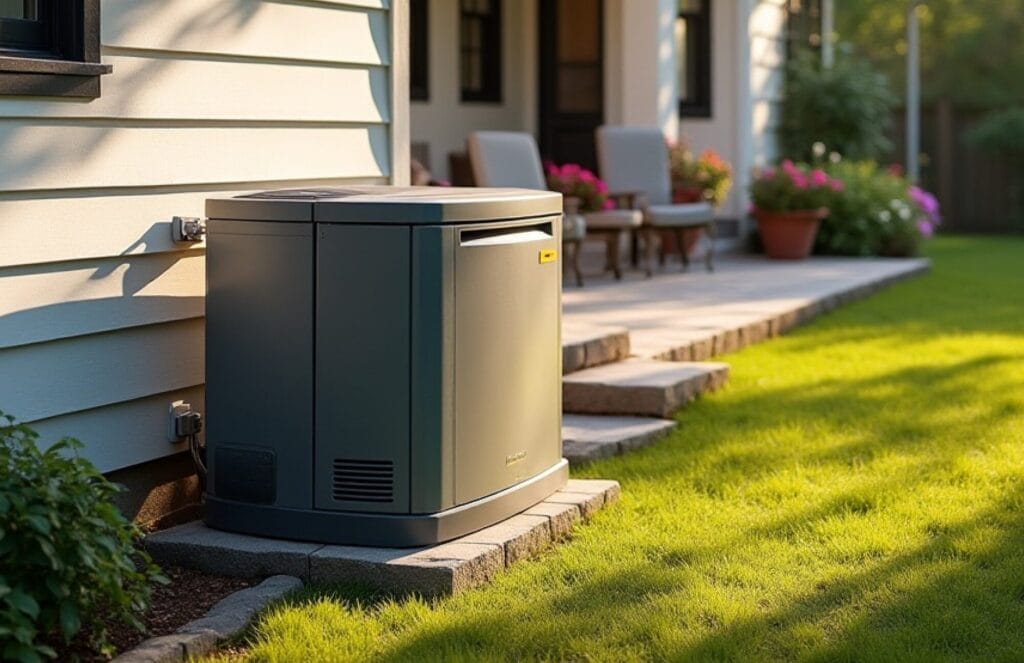
You’re settling in for a cozy evening when the lights flicker and die. The storm outside shows no signs of stopping. Hours pass, maybe days. Your fridge goes silent. The heat cuts out. You’re fumbling for flashlights in the dark.
Sound familiar? That’s exactly why smart homeowners invest in backup generators. These aren’t just about keeping lights on—they protect your food, maintain comfortable temperatures, and deliver real peace of mind when Mother Nature strikes.
But here’s the tricky part: Should you go with a standby generator or stick with portable? And once you’ve made that choice, how do you keep the thing running when it matters most?
We’ve walked countless families through these decisions. Let’s break it down together.
Understanding Your Power Backup Options
Power outages hit your comfort systems first. Heat, air conditioning, ventilation—gone. That’s why backup power matters so much for maintaining a livable home environment.
Generators come in two main flavors. Standby units are installed permanently and kick in automatically when power is lost. Portable generators require you to haul them out and fire them up manually.
The choice isn’t just about power output. It’s about lifestyle, budget, and convenience during emergencies. Some people love the convenience of the “set it and forget it” approach. Others prefer flexibility and lower upfront costs.
Think about what matters during an outage. Just need the fridge running and a few lights? Or do you want the whole house operating normally, including your HVAC system?
Your answer shapes everything.

Standby Generators: Your Home’s Silent Guardian
Standby generators are the premium backup solution. They sit outside permanently, wired directly to your electrical panel and gas line. When power cuts out, they sense it instantly and restore electricity within seconds.
Think of them as silent bodyguards for your home’s electrical system. You don’t need to be home for them to work. They’ll protect your house even during vacation. This automatic operation keeps your electricity running, preventing food from going bad, frozen pipes in winter, or humidity damage in summer.
Key advantages include:
- Automatic startup means zero worry about manual operation
- Whole-house power keeps everything running normally
- Permanent installation eliminates storage and setup hassles
- Natural gas fuel reduces maintenance headaches
- Weather-resistant design handles year-round outdoor duty
The investment runs steep—several thousand to over ten thousand dollars installed. Many homeowners find the convenience worth every penny, though. Installation needs professional electrical work and often gas line modifications.
Standby generators make sense if outages hit frequently, you have medical equipment requiring constant power, you work from home regularly, or you simply want uninterrupted comfort regardless of grid problems.

Portable Generators: Flexibility When You Need It
Portable generators offer a budget-friendly entry into backup power. Most run on gasoline and wheel out of storage when needed. You’ll start them manually and connect through transfer switches or extension cords.
They demand more hands-on work but deliver valuable flexibility. You can take them camping. Use them for outdoor events. Loan them to neighbors in need.
Benefits and limitations include:
- Lower upfront costs make them accessible for tight budgets
- Portability enables multiple uses beyond emergency backup
- No permanent installation required for easier setup
- Fuel storage and refueling become your responsibility
- Manual operation requires your presence to start and monitor
- Weather protection needs covered operation areas
Safety matters critically with portable units. Never operate indoors or in enclosed spaces—carbon monoxide kills. Ensure adequate ventilation and install CO detectors throughout your home.
Portable generators work well for occasional outages, backup power for specific appliances, or for those with lower initial investment preferences. They’re perfect for renters who can’t install permanent equipment.
Making the Right Choice for Your Family
Your generator choice depends on outage frequency, duration, and severity. Rare, brief outages might suit portable units fine. Frequent or extended outages make standby systems more attractive.
Consider must-have appliances during outages. Need just basics—fridge, lights, sump pump? Quality portable generators handle this easily. Want your entire home functioning normally, including central air? You’ll likely need standby power.
Budget matters beyond purchase price. Portable generators need ongoing fuel purchases and frequent maintenance. Standby units cost more upfront but less to operate long-term, especially with natural gas service.
Physical capabilities count too. Portable generators require lifting, moving, and manual startup. Mobility concerns or frequent travel make automatic standby operation invaluable.
Essential Maintenance: Keeping Your Generator Ready
A generator that won’t start when needed is worse than no generator at all. Regular maintenance ensures your backup system performs when the lights go out. Basic generator care isn’t complicated but requires consistency.
Both generator types need attention, though requirements differ slightly. Establish a routine and stick with it rather than remembering your generator only when storms approach.
Essential maintenance includes:
- Monthly test runs for fifteen to thirty minutes under load
- Oil changes according to manufacturer schedules
- Regular air filter replacement, especially in dusty conditions
- Fresh fuel in portable units or secure gas line connections
- Inspection for loose bolts, worn belts, corrosion, or damage
- Debris cleaning from air intake and exhaust areas
Portable generators need careful fuel management. Gasoline degrades over time, so use stabilizers or rotate the supply regularly. Store extra fuel safely following local regulations.
Standby generators require annual professional maintenance. This service checks electrical connections, tests automatic transfer switches, and ensures proper communication between the generator and home electrical systems. Don’t skip professional maintenance—it’s essential for reliable automatic operation.
Your Power, Your Peace of Mind
The right generator balances your needs, budget, and lifestyle preferences. Standby units offer unmatched convenience and whole-house protection. Portable units provide flexibility and lower upfront investment. Both options dramatically improve comfort and safety during outages.
Proper installation and maintenance matter as much as choosing the right generator type. Working with a qualified electrician ensures your backup power system performs when you need it most.
Ready to explore generator options? Our team helps assess power needs, compare solutions, and ensure proper installation and maintenance. Because when power goes out, you shouldn’t worry about staying comfortable and safe at home.

